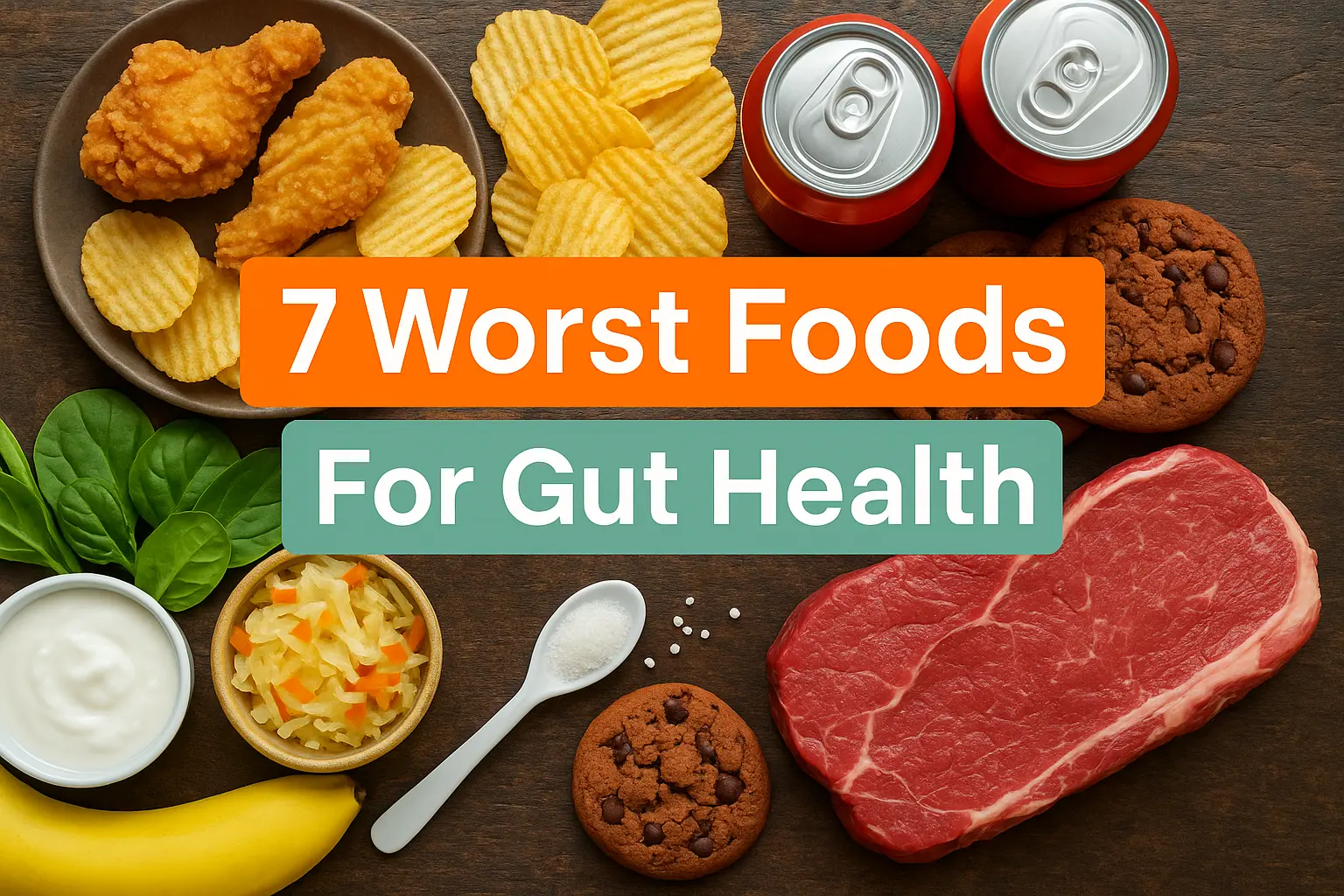
Worst Foods for Gut Health: What to Eat Instead?
July 11, 2025
When we think about health, we often focus on the heart, weight, and mental health. Something many people miss is where several of these other health issues start, the gut. The gut is more than just a digestive machine; it’s home to trillions of bacteria, fungi, and other microbes. Gut health is a complex ecosystem responsible for immunity, mood stabilization, metabolism, and skin health.
While most people attempt to support gut health with probiotics or fiber, few realize that certain everyday foods may be causing real damage. Processed snacks and seemingly innocent ingredients like artificial sweeteners can cause gas, bloating, and long-term gut dysfunction. In this guide, we will walk you through the worst foods for gut health, common signs of a bad gut, and gut-healthy alternatives. Let’s dive in!
Why Gut Health Matters?
Your gut is the powerhouse of more than 50 percent of the immune system and plays a crucial role in nutrient absorption, hormone balance, and detoxification.
At the core of the gut microbiome is the collection of microorganisms like bacteria, fungi, and viruses and their genes that live in a specific environment, such as the human body, soil, or plants. The microbiome helps maintain a balance of good and bad bacteria in the gut. When this balance is disrupted, it can lead to a host of issues, including inflammation, bloating, fatigue, mood swings, and even chronic diseases. Hence, a gut-healthy diet is essential for both digestion and overall well-being.
Common Signs Your Gut Might Be Struggling
Recognizing the signs of poor gut health can help you make timely changes in your diet, routine, and lifestyle. Some of the poor gut health signs include:
- Frequent bloating or gas
- Irregular bowel movements (constipation or diarrhea)
- Food intolerances
- Persistent fatigue
- Skin breakouts or dullness
- Mood fluctuations or anxiety
- Sugar cravings
- Poor appetite control
7 Worst Foods for Gut Health: Why to Avoid Them
Certain ingredients and foods are known to trigger the digestive system. These food items can contribute to a weakened gut lining, a condition sometimes referred to as leaky gut. It’s best to avoid these digestive trigger foods if you’re serious about improving your gut health.
-
Processed foods
Processed foods and gut issues often go hand in hand. It may not impact immediately, but there will be signs. Packages, items, frozen meals, and fast food are loaded with triggers, preservatives, emulsifiers, and additives that alter gut bacteria and increase inflammation in the intestines.
-
Artificial sweeteners
While proudly advertised calorie-free products may help you control your weight, sweeteners such as aspartame and sucralose can alter gut flora, potentially spiking glucose levels. These are top-tier gut disruptors and often exacerbate foods that cause bloating and gas.
-
Fried foods
Fried foods are high in unhealthy fats that can slow the digestion process and promote inflammation. They’re hard to break down and can increase the risk of harmful gut bacteria, eventually leading to bloating, gas, and discomfort.
-
Excessive red meat
Processed meats are often lacking in fiber and can be difficult to digest. Their high saturated fat makes them highly inflammatory foods that can reduce microbial diversity over time.
-
Dairy (for some)
Dairy can cause a bad gut for some people. For lactose-intolerant individuals, dairy can cause gas, cramping, and even diarrhea in severe cases. Even a protein in milk can sometimes act as a digestive trigger food.
-
Spicy Food
Spices like chili, black pepper, and turmeric can irritate the digestive lining, especially in individuals with sensitive digestive systems, leading to indigestion, heartburn, and worsening symptoms of irritable bowel syndrome (IBS).
-
Corn
Although technically a vegetable, corn can be difficult to digest for some individuals. Due to its tough cellulose structure, it often passes through the gut undigested and may contribute to gas and bloating.
Ten Worst Foods for IBS, Acid Reflux, and More
IBS, acid reflux, or constipation are serious gut-related issues. Let’s break down everyday poor diet items that can irritate gut bacteria, causing IBS, acid reflux, and more.
Ten Worst Foods for IBS
Inflammatory Bowel Syndrome (IBS) is highly sensitive to fermentable carbs (FODMAPs) and irritants. To avoid symptoms of IBS, avoid eating the worst foods that may trigger symptoms. Some of the most common triggers include onions, garlic, beans, cabbage, carbonated drinks, artificial sweeteners, dairy, fried foods, alcohol, and caffeine.
Ten Worst Foods for Acid Reflux
These foods relax the lower esophageal sphincter and trigger heartburn. The intake of citrus, tomatoes, coffee, alcohol, chocolate, spicy foods, peppermint, garlic, fatty foods, and soda can cause acid reflux or GERD. The avoidance of these foods, or with the proper eating habits, you can manage the acid reflux easily.
Worst Foods for Diarrhea
Certain foods worsen diarrhea by increasing gut motility or irritation. Items include greasy meals, caffeine, alcohol, raw veggies, and milk (in some cases).
Worst Foods for Crohn’s Disease
Crohn’s disease is a chronic inflammatory bowel disease that can affect the digestive tract from mouth to anus. The worst foods for gut health in Crohn’s disease include popcorn, nuts, seeds, spicy food, and raw fruits and veggies.
What to Eat Instead: Gut-Healthy Food Alternatives
Avoiding trigger foods is only part of the solution. Choosing healthy, gut-friendly options can make a big difference. The right foods help nourish beneficial bacteria and promote a balanced gut microbiome. Here are some of the best foods to support a healthy digestive system.
- Fermented Foods: Yogurt, kimchi, sauerkraut, tempeh
- Prebiotic-Rich Foods: Garlic, onions, bananas, leeks, asparagus
- High-Fiber Veggies: Spinach, broccoli, carrots, zucchini
- Healthy Fats: Avocados, nuts, seeds, olive oil
- Whole Grains (if tolerated): Oats, quinoa, brown rice
Common Questions About Hard-to-Digest Foods
In certain cases, even healthy foods can cause digestive issues. Below are some of the most common questions about gut and hard-to-digest foods.
1. What naturally kills bad bacteria in the gut?
Your gut naturally regulates bacteria, but certain foods and herbs can help. Consuming these as part of your gut health diet can help maintain balance and keep harmful bacteria in check.
- Garlic and ginger
- Oregano oil
- Green tea
- Fermented foods
- Fiber-rich diet
2. Is gluten bad for gut health?
Gluten is only harmful to gut health for people with gluten sensitivity or celiac disease. When consumed in moderate amounts, whole grains can be gut-friendly.
3. Is dairy harmful to everyone?
Dairy is not harmful for everyone. For many, especially adults with decreased lactase production, dairy foods can cause bloating and gas.
4. What foods are hard to digest?
Foods high in fat, fiber, or certain carbohydrates can be hard to digest. Common examples include fried foods, beans, vegetables like broccoli and cabbage, and dairy (for lactose-intolerant individuals).
5. Can spicy food cause diarrhea?
Yes, in severe cases. Spicy foods, especially those with capsaicin (found in chili peppers), can irritate the gut lining and speed up digestion, which may lead to diarrhea in sensitive individuals.
6. Do sweet potatoes cause gas?
Sweet potatoes contain complex carbs and fiber, which can cause gas when consumed in large amounts. However, they’re generally easier to digest than many other starchy vegetables.
7. Do cherries cause gas?
Yes. Cherries are high in fructose and sorbitol. These natural sugars can disturb the gut and cause gas or bloating, particularly in people with sensitive digestion or IBS.
8. What are the foods that don’t cause bloating and gas?
Foods that are typically gentle on the digestive system include zucchini, spinach, cucumbers, bananas, white rice, oats, eggs, and lean proteins. Well-cooked vegetables are often better tolerated than raw ones.
Conclusion
The way to a healthier gut starts by eliminating certain foods from your diet. By putting an end to the worst foods for gut health and incorporating gut-health foods, you can improve digestion, reduce inflammation, and support long-term gut wellness. Start with the small changes in your diet and witness a massive impact on how you feel after eating a meal.
FAQs
How to improve gut health in a week?
Some minor improvements (like reduced bloating or better bowel movements) can be managed in a week. Start with fiber-rich fruits and vegetables, add fermented foods to your diet, stay hydrated, avoid processed & artificial items, and get enough sleep.
Can eggs cause issues for gut health?
No, eggs are generally well-tolerated and a good source of protein unless you have a specific allergy or intolerance.
What’s best to eat for breakfast for a healthy gut?
To start your day with a gut-healthy diet, try oats topped with berries and chia seeds, or a smoothie with kefir, banana, and flaxseed.
What are the common symptoms of leaky gut?
Leaky gut refers to increased intestinal permeability, which can often be recognized by symptoms including bloating, gas, fatigue, headaches, and food sensitivities, many of which overlap with other gastrointestinal conditions.
What are the worst foods for gut health?
Highly processed foods are widely considered the most harmful and worst foods for gut health.
